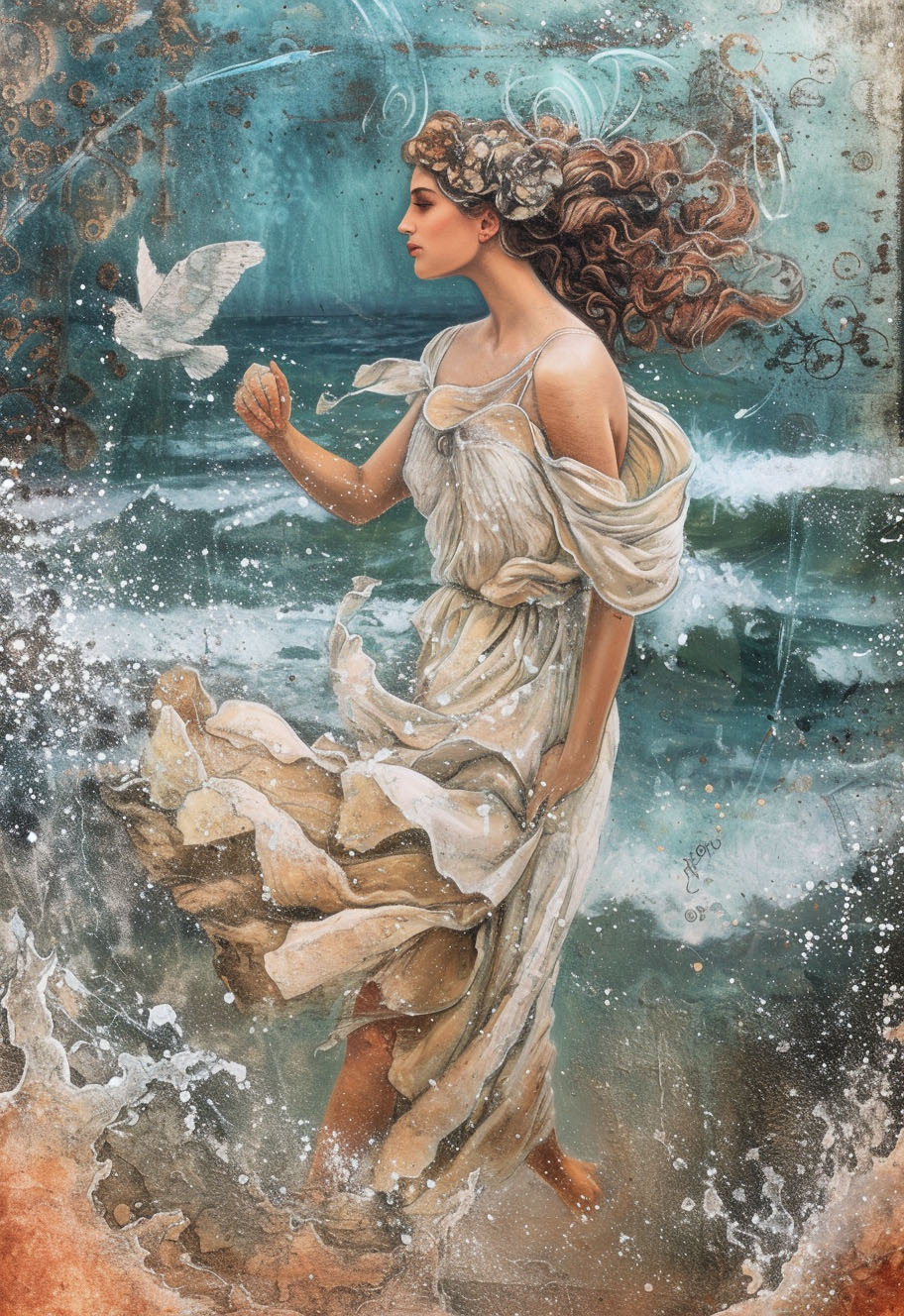Tethys
In Greek mythology, Tethys is a Titaness, a primordial deity associated with the sea and freshwater. She is the daughter of Uranus (the sky) and Gaea (the Earth) and is often depicted as the wife of her brother, Oceanus, another Titan. Here are key aspects of Tethys in Greek mythology:

Parentage and Generation: Tethys is born from Uranus and Gaea, making her one of the Titans. She belongs to the first generation of divine beings in Greek mythology.
Marital Union with Oceanus: Tethys is frequently identified as the wife of Oceanus, and together, they are the parents of the Oceanids, nymphs associated with various bodies of water, including rivers, lakes, and springs.
Mother of Rivers: Tethys is considered the mother of various rivers, and her children, the Oceanids, are often associated with specific bodies of water. In this capacity, she represents the nurturing aspect of freshwater.
Neutral Stance in the Titanomachy: Similar to her husband Oceanus, Tethys did not take sides in the Titanomachy, the war between the Titans and the Olympian gods. Consequently, she was not imprisoned in Tartarus with the defeated Titans.
Cosmic Symbolism: Tethys and Oceanus are often regarded as symbolic representations of the cosmic river that encircles the world. They embody the concept of the unending flow of water that encompasses the entire earth.
Counsel to Prometheus: According to some traditions, Tethys and Oceanus provided counsel and assistance to Prometheus when he was punished by Zeus for stealing fire and giving it to humans.
Cultural and Literary References: Tethys is mentioned in various ancient Greek texts, including Hesiod's "Theogony." In this work, the poet provides a genealogy of the gods, outlining the relationships between the Titans and other divine beings.
Motherhood and Fertility: Tethys, as a mother of rivers and freshwater nymphs, embodies the nurturing and life-giving aspects of water. Her connection to rivers underscores the importance of water sources in sustaining life.
Representation in Art: In ancient art, Tethys is sometimes depicted alongside Oceanus, emphasizing their role as cosmic entities and personifications of the sea.
Later Interpretations: In Roman mythology, Tethys and Oceanus were sometimes identified with the concept of the world ocean. Their portrayal continued to influence later cultural and artistic representations.
Tethys, as a Titaness associated with freshwater, played a significant role in the divine order of the ancient Greek cosmos. Her mythic attributes highlight the interconnectedness of the natural elements, particularly the significance of rivers and the sea in the ancient Greek worldview.
Immediate Family
Quick Facts
- Tethys belongs to the first generation of Titans.
- She is married to her brother, Oceanus.
- Tethys is the mother of the Oceanids.
- She remained neutral in the Titanomachy.
- Tethys symbolizes the cosmic river with Oceanus.
- She provided counsel to Prometheus.
- Tethys is mentioned in Hesiod's "Theogony."
- As a mother of rivers, she embodies nurturing and life.
- Tethys and Oceanus are depicted in ancient art.
- In Roman mythology, they were associated with the world ocean.
Further Reading
Art &
Architecture
Ancient Greek art and architecture, with its harmonious proportions and timeless elegance, continue to inspire awe and admiration millennia later.
Discover
Greek Mythology & Mythical Characters
Greek mythology, a rich tapestry of gods, heroes, and mythical creatures, captivates the imagination with its tales of love, betrayal, and epic adventures that delve into the depths of the human psyche.
Discover
Ancient Greek History
Ancient Greek history, marked by remarkable achievements in democracy, philosophy, and warfare, shaped the foundation of Western civilization, leaving an indelible legacy of innovation and cultural influence that continues to resonate to this day.
Discover
Ancient Greek Olympics
The ancient Greek Olympics, held in Olympia every four years, celebrated athleticism, unity, and cultural pride, serving as a testament to the enduring spirit of competition and excellence that transcends time and borders.
Discover
Ancient Greek Wars
Ancient Greek wars, such as the Persian Wars and the Peloponnesian War, were pivotal conflicts that shaped the course of history, highlighting the struggle for power, independence, and the clash of civilizations in the ancient Mediterranean world.
Discover
Ancient Greek Culture and Society
Ancient Greek culture and society, characterized by its emphasis on art, philosophy, and civic engagement, fostered a vibrant intellectual and social landscape where innovation flourished, democracy thrived, and the pursuit of knowledge and excellence was celebrated as fundamental values of civilized life.
Discover

